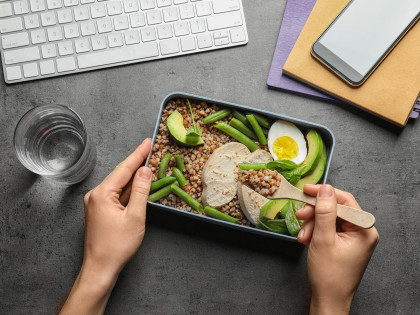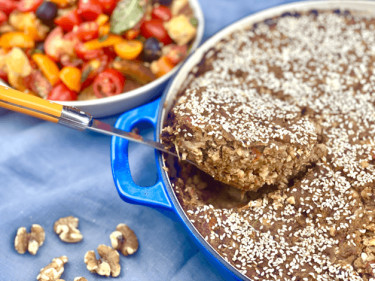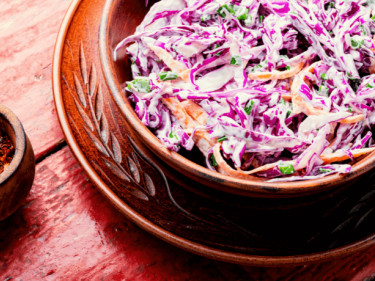While there’s no magic cure when it comes to preventing or curing a common cold, promises are found across social media relating to specific foods and supplements that claim to provide some relief.
So, what are these common remedies? Let’s take a look at the latest evidence too.
Vitamin C
Unfortunately, for most people vitamin C does not reduce either the severity or number of colds you can get.
The research indicates there are some exceptions though! If you are extremely physically active, like a snow skier, soldier or marathon runner exercising in very cold conditions, studies have shown that 0.6-1g of daily vitamin C can actually halve the chances of getting a cold!
Caution is advised when considering a vitamin C supplement - especially for men. Some research has linked high dose vitamin C supplementation (regular intake of ≥1g/day) with a higher risk of kidney stones in men.
Zinc
While it has not been proven to assist with the severity of colds, a review of studies conducted in healthy adults found that taking at least 75 mg of zinc within 24 hours of a cold’s symptoms occurring shortened the duration of colds by about one-third!
Keep in mind that taking too much zinc can trigger a copper deficiency, so be sure to stop the supplement after the first day.
Chicken soup
There’s nothing better than sitting down with a nice warm soup when you’re sick, and some research has actually shown that comfort foods, such as chicken soup, can help us feel better!
Another study on chicken soup found it can help fight infection and aid recovery from respiratory tract infections.
It’s also been suggested that chicken soup can stimulate smell and taste receptors, allowing for increased nasal mucus flow - therefore clearer breathing.
Try Hannah's chicken noodle soup.
Garlic
Garlic may be attributed as having immune-boosting powers, but the research proving it is limited.
One study found that people taking a daily garlic supplement for 3 months had fewer colds, but when they did get sick, their colds lasted just as long as those not taking it.
Since this was only one trial (and not the strongest quality), we can’t say for sure whether it really works or not. You will need to balance out any potential side effects like bad breath, body odour or skin rashes versus any perceived benefits!
Probiotics
Probiotics show some promise with one study finding reduced frequency and shorter duration of colds in those taking probiotic supplements regularly. While these results are encouraging, higher quality evidence from additional studies is still needed.
We recommend opting for food sources of probiotics such as live culture yoghurt, kefir and sauerkraut as these provide other beneficial nutrients, like protein and calcium as well as healthy gut bacteria.
No Money No Time: Which type of yogurt is healthier?
Echinacea
Echinacea is a popular herbal remedy for the common cold, but the research is highly variable, meaning some studies showed no benefits and some did.
Some studies suggest that Echinacea might slightly reduce your chances of getting a cold, but there’s limited evidence to support that it reduces the duration or severity of illness.
Andrographis
Andrographis is another herbal ingredient found in some supplements marketed for immune support. While some studies suggest it may help reduce the severity and duration of cold symptoms when taken once cold symptoms begin, it’s not without risks, with both allergic reactions and other side-effects reported.
The Therapeutic Goods Administration (TGA) has issued a safety advisory warning that Andrographis may cause severe allergic reactions including anaphylaxis, even in people who have used it before without any issues. In the USA, there have been reports of exacerbation in symptoms among some people with autoimmune conditions such as multiple sclerosis, lupus, or rheumatoid arthritis. It is best to avoid using Andrographis if you have one of these conditions.
If you’ve ever had any type of reaction to a product containing Andrographis, or even Echinacea, it’s best to steer clear of both ingredients as future reactions have been reported to be more severe.
Always stop use and seek medical advice at the first sign of a reaction.
Our NMNT tips
While some supplements might show minor benefits for the common cold, everyday factors (as well as usual food choices) can make a real difference.
To minimise your chances of coming down with a cold some good tips are:
- Always wash your hands before preparing and eating food (as well as after blowing your nose)
- If you do catch a cold, stay hydrated, rest up and you should be feeling better in no time!
- Get some vitamin D from sun-safe time in the sunshine or vitamin D-rich foods (like salmon, eggs, and mushrooms). This can help keep your immune defenses in top shape. For more information on vitamin D, see NMNT How can I get enough Vitamin D and Nutrition Science Bites podcast Why is everyone Vitamin D deficient?
- Eat a variety of healthy, nutritious foods every day. Focus on wholegrains, fruits, veggies, legumes, lean meats and dairy foods that provide essential nutrients that your immune system needs to stay strong.
- Drink plenty of water
Looking for more?
No Money No Time: Which nutrients help to support my immune system?
Nutrition Science Bites podcast: Should you take vitamin C or other supplements for a common cold?













